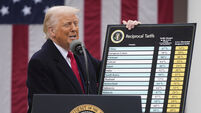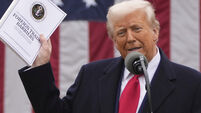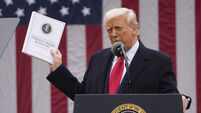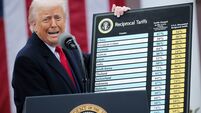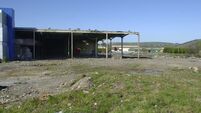Government ‘terrified’ as Trump’s tariff plans threaten Irish exports and foreign investment

The very real prospect of tariffs set to be announced by Donald Trump on 'Liberation Day' next week is striking fear into the Government. Photo: AP/Mark Schiefelbein
The speaking row antics in the Dáil this week have shown that even when faced with a profound economic threat politicians on all sides can cynically be more preoccupied with petty point scoring.
But the very real prospect of tariffs set to be announced by Donald Trump on 'Liberation Day' next week is striking fear into the Government. "It’s terrifying," one minister privately confided this week.
Stepping into the unknown is the one of the biggest concerns raised by senior members of the coalition who have stressed that while there has been considerable interaction with business and constant consultation at EU level, the Trump administration has refused to adhere to the political norms.
While strong backchannel dialogue has for decades been an essential element of international diplomacy, Trump and his inner team has ignored many of the well-established rules of engagement, indeed the administration has re-written how to do business almost overnight.
Many in diplomatic circles say this will have wider and longer-term impacts, but in the immediate term it has left European leaders on tenterhooks over tariffs.
"We don't know what is coming, we know the rhetoric but we don't have any idea of what is going to be in the executive order," said one senior minister. "The EU is trying to engage with the US administration, but the US won't engage until after April 2."
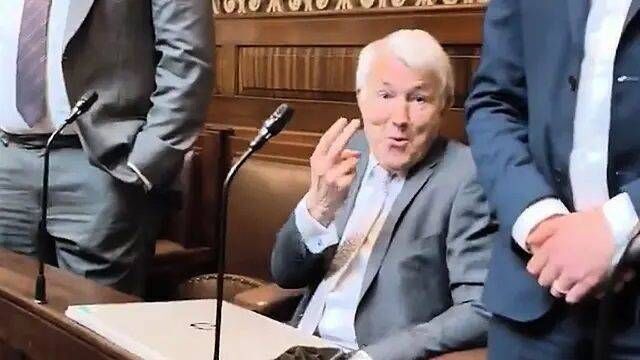
The minister added that no concrete assurances have been provided that substantial discussions will open up even after next week's announcement. Although some precedent has been set with Mexico and Canada.
There has been some level of dialogue with Maroš Šefčovič, the EU's Commissioner for Trade and Economic Security, but as one senior source put it: "Ultimately a lot of this hinges on the decision of one man. This is a very different administration."
It has been pointed out that while Brexit posed a grave economic and political threat to Ireland in particular, the parameters were broadly marked out. We knew the UK would no longer be part of the EU and planning could begin for this change well in advance in tandem with deep level negotiations.
With tariffs looming, a number of projections have been put forward based on a sliding scale of possibilities, none of them positive.
In a brief break from the interruptions and drama around the Ceann Comhairle, Lowry's two fingers and speaking rights, the Taoiseach this week warned the Dáil that tariffs will "dwarf anything" currently being discussed by our politicians.
"It will be profound if it is not satisfactorily resolved by dialogue," Martin said.
The Government and top level officials have been forward planning for the economic fallout, with the running assumption that tariffs of anywhere between 20% and 24% on a variety of goods will be imposed.
Finance minister Paschal Donohoe has already warned that, with models from his department and the Economic and Social Research Institute (ESRI) showing that a trade war between the US and EU could lead to tens of billions of euro lost to the Irish economy.
Speaking in Brussels on Friday, public expenditure minister Jack Chambers said the Government is "war gaming and scenario planning" for all the different outcomes that may materialise.
"We know that the uncertainty of tariffs will bring serious implications for growth and employment tomorrow and over the coming years," he said adding that the Brexit-related trade implications "didn't necessarily crystalize" immediately.
However, another minister signalled a reassuring note that unlike other areas that are highly mobile the pharma sector “cannot be moved overnight" due to workforce and facility constraints. He added that “there is a European market to serve” which will not be impacted even by the most severe of tariffs.
While high tech and expensive manufacturing plants that are based here may not move, at least not in the short term, tariffs will impact further investment or expansion.
It is undershot that the IDA is now working to the mantra of 'keep what we have', when it comes to US foreign direct investment.
To counter tariffs, the coalition knows it must place a more urgent emphasis on measures to retain and support companies, especially in the pharmaceutical sector.
A number of memos will be brought to Cabinet in the coming weeks, including one from Chambers that will focus on value for money in relation to overall public spending; anther memo on the National Development Plan will also be progressed.
This will feed into a separate memo due to be brought by enterprise minister Peter Burke in the next two weeks on a competitiveness action plan. This accelerated plan will focus on resolving issues which are seen as blocking further investment such as the energy grid, wastewater connections and EPA licensing.
Many within the Government have privately accepted that blinded by a buoyant economy and ever-increasing corporation tax takes in recent years, a certain complacency set in, which has now led to a situation where the country's infrastructure deficit is negatively impacting on our resilience and competitiveness.
Regardless of what is announced on 'Liberation Day', the Government needs to address housing, energy, water and transport in order to protect what we cannot afford to lose.

